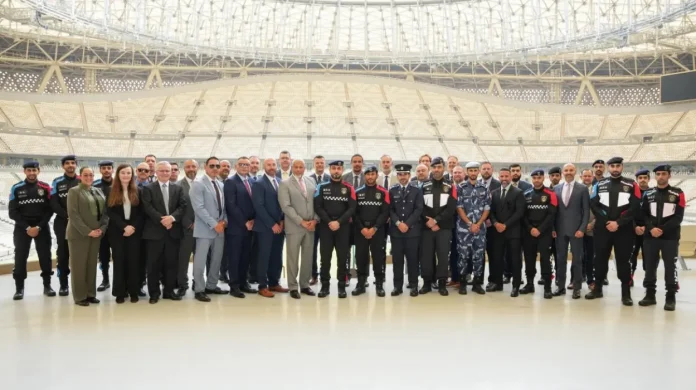With the upcoming 2026 FIFA World Cup in the United States, Canada, and Mexico, the security model advances at FIFA, coming under increased attention. FIFA also places the security of the events fully in the hands of host countries at variance with other international organizations with uniform enforcement of the rules. This is very weak in the decentralized form of international sports governance.
FIFA does not have its own centralized enforcement agency, however it does give general regulatory instructions. Rather, it is likely to be left to host countries to handle all practicalities, such as crowd control, station security, emergency management and cyber security. Such a model imposes a heavy burden to local institutions, which tend to differ significantly in capacity, accountability and resources. Although some countries are fully equipped and able to deliver on these requirements, some others find it hard, leaving them exposed to vulnerabilities that FIFA lacks means to respond to in real time.
Olympic Games vs. FIFA World Cup security models
Although it has not escaped criticism, the International Olympic Committee (IOC) has developed a more center-based and homogenized organizational security strategy. Its liaisons with the host cities, foreign intelligence organs, and human rights observers enable it to put in place fairly unified security measures particularly in high-risk times. On the contrary, FIFA hands off approach leads to a variance in security standards across tournaments and venues.
This difference implies that the security machinery of the World Cup can be strong in one game and disconnected in the next one. The fact that cross-border enforcement of security standards does not apply to the host countries poses doubts regarding the safety of participants as well as on the global stewardship duties of FIFA.
Operational risk without institutional oversight
The accountability structure of FIFA is weakened without an inside horse to its riding mechanism and a follow-up within an unstable course. When the security lapses are experienced such as crowds or terrorist threats or failure to move logistically FIFA has little to do about it by intervening, or by passing orders to correct the error. Such institutional fragmentation leaves room to reputational harm, especially in an era when people are ever watchful and public condemnation is immediate and widespread in nature.
Implications for global governance and accountability
FIFA’s organizational structure reflects a general pattern in transnational sporting governance: risk is outsourced, yet gains are retained in the center. Whereas host nations fund and manage the essential aspects of event security, FIFA receives most of the commercial income, sponsorship deals, and brand power. In times of crisis, the reputational losses are at times shared collectively, but structural gaps remain unaddressed.
This externalization of risk builds an accountability deficit. The players, the media, and public might demand explanations, but with no unifying system of governance, FIFA lacks few instruments by which to implement real change among its partners. Insistent adherence to review after the event rather than proactive enforcement only works to prevent institutional development.
Complexity of cross-border coordination in 2026
The added level of complexity with the approaching 2026 tournament is not only that it will be the first three-country World Cup, but it will have three distinct national security systems to coordinate. Cross-border travel, jurisdiction over stadiums, and intelligence sharing needs are just a few issues that highlight the vulnerability of a decentralized system. The three-country setup demands coordination that FIFA is organizationally not equipped to provide on its own.
The Qatar precedent and lessons for 2026
The 2022 Qatar World Cup is both a warning and a benchmark. Qatar brought in advanced surveillance systems, biometric surveillance, and live crowd management technologies. These actions received some international commentators’ welcome but also generated worldwide debates on privacy, freedom of movement, and ethical standards.
FIFA’s inability to audit or regulate these phases illustrates its governance weaknesses. Although the security infrastructure functioned effectively during the tournament, it was shaped by the host’s domestic priorities rather than a universal FIFA standard.
Learning through external cooperation
In early 2025, a delegation from the FBI visited Qatar to study the Gulf state’s event security management. This was in an attempt to derive lessons that can be applied in the U.S led half of the 2026 event. This trade highlights the defensive stance of FIFA – it is using the local experience of host nations instead of learning to be proactive and adopting a centralized security model.
The fact that agencies such as the FBI were called in to fill the institutional gaps of FIFA serves as an example of how a more unified security system has to be created that only does not limit the abilities of individual countries. Amidst the increasing scale of the World Cup, the imperative of institutional change in the FIFA itself increases as well.
Stakeholders’ perspectives on security governance
Multilateral negotiations and multinational training exercises have been started by governments participating in co-hosting the World Cup in 2026, the aim of which is to synchronise their security systems. At times these initiatives are not even under direct direction of FIFA so they show a sense of understanding of the gap of governance. National agencies have been forced to intervene in situations where the organizational structure of FIFA has failed.
Civil society organizations have been pounding on open, human-rights conforming security procedures at global sports events. They assert that the decentralized security systems threaten to give free rein to abusive tendencies in the pretext of national security. There is no central case of standards provided by FIFA; hence, it is hard to guarantee the adherence to the international standards.
Observations from security analysts
Kristina Sec Noem, an international security analyst, summarized the issue succinctly in a statement on her verified account: FIFA’s current model “delegates vital responsibilities but lacks the unified governance mechanisms needed to enforce security standards globally.” Her statement points to a structural flaw that has become increasingly difficult to overlook as tournaments grow in complexity and scale.
Today, I met with Qatar’s Minister of Interior @MOI_QatarEn to discuss our mutual cooperation ahead of the FIFA World Cup in 2026.
I am grateful for Minister Al Thani’s leadership, and look forward to the USA hosting the 2026 World Cup! pic.twitter.com/FzqruDYwks
— Secretary Kristi Noem (@Sec_Noem) July 9, 2025
Security issues are no longer limited to physical violence, but it now involves cyber sabotage, information leaks, online monitoring and viral campaigns that can attack both fans and athletes. The increasingly broad scopes of risk are calling to a more centralized, technically proficient model of governance that can respond in an adaptive manner.
Building a new model for security coordination
A means to solve this problem could be the creation of a hybrid model. In that sort of regime, FIFA may maintain a centralized control with the right to enforce basic requirements, but host countries may implement with local significance in consonance with domestic law. This would provide flexibility required to consider the sovereignty and at the same time promote consistency in the risk mitigation and response to crisis.
Such a body may consist of a dedicated FIFA security bureau that is authorized to coordinate joint audits, give recommendations on technology purchasing, or act as an intermediary between a host country and global law enforcement. This would make the coordination smooth as well as increase transparency and stakeholder confidence.
Blending sovereignty with responsibility
It is vital to respect the national jurisdiction, which involves the host countries having operational control, but the need to have international cooperation in the context of safe mega-events is an important new requirement, so countries should consider this aspect of international accountability. The role approach of FIFA must shift to an active overseer that is able to integrate security plans across boundaries and agencies.
The need by FIFA to rely on host nations when it comes to security management- as far as it was pragmatic, only on isolated circumstances- has now become an organizational weakness as the World Cup turns more scale and complex. The existing model restricts the capacity of FIFA to act as a crisis responder, promote accountability and hold universal standards. Vacillating between these choices, FIFA will be forced, before the 2026 World Cup, to make its decisive decision: to reform its governance structures or to remain anchored in a decentralization that puts its main product, the flagship event, at risk. Such desire, or lack thereof, to change will determine not only the safety of the events in the future but also the reputation of professional bodies like FIFA in the age of mounting oversight.













